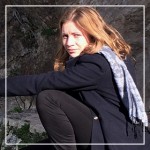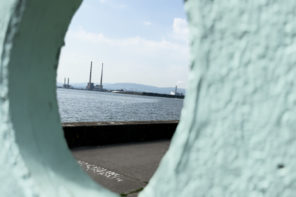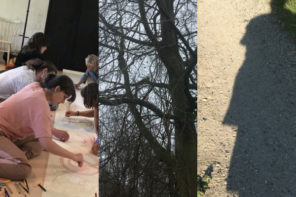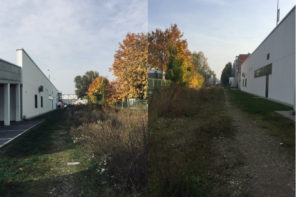Is fieldwork a pair of contact lenses or eye surgery – and what are eyes anyway?
I was in Lebanon for entirely personal reasons. I was under no compulsion to think or write like an anthropologist at any moment of those five weeks; nor was I surrounded by fellow anthropologists whose presence might have made me look for crumbs of thought, material for summer night semi-academic discussions. Moreover, being there before the game-changing, year-long period of PhD fieldwork I definitely did not consider myself to be anything more than an anthropologist in the making. And yet I found myself unable to perceive the country with the naked eyes (if such things ever exist) of someone unaware of interpretive concepts.
I heard a story about a Syrian worker moving into a Christian Palestinian camp in search of better living conditions and even naming his son after a Christian saint; another about a wealthy businessman from Dubai buying the entire hilltop above a village in the Mountain and fencing it off with ugly concrete, to which the villagers responded by erecting an enormous cross right next to the wall and swearing never to sell land to anybody from the Gulf countries again. Somehow these stories lost their absorbing simplicity when they sneaked into my anthropologically transformed mind, appropriating the world in terms of power structures, spatial distinction, political economy and cultural memory. The toolkits of social scientific analysis, particularly taxonomies, were like immovable contact lenses, and my personal life became the primary material for these unasked-for interpretations.
This rather mundane experience is not as harmless as it seems.
It is crucial for anthropologists to know if we can consciously start or stop sensing like an anthropologist, and whether or not our perceptions in the fieldwork situation differ from those outside it. If anthropological expertise partly lies in an altered way of perceiving the world, then this has methodological implications for participant observation and it also leads us into messy questions about the relationship between culture and perception.
Disciplinary perceptions? Seeing and ‘seeing as’
My Lebanese experience has manifold ethical and epistemological consequences. Where did that interpretive voice come from? It was definitely something shaped by a certain academic culture. If perception is modified by the bundle of experiences we could call culture, there might be a set of crucial experiences – say, educational and professional – that could be identified and separated in our perceptions. An anthropological layer could be teased out, which in this case would constitute the core of our ‘expertise’, however vague this might sound. Or so it seems at first sight. This approach, however, would imply a rather cognitivist theory of perception.
To throw one more stone at undeservingly vilified Descartes and his dualism: when we conceive of the fieldwork mindset as an ‘added feature’ we could turn off, we are in accord with the distinction between sensation and intellection, following classic anthropological theories of perception. In the model proposed here, however, representations of ideas are supplemented by additional forms, like affirmation, emotions or recognition (Descartes 1991(II): 25-6). In terms of cognitive schemata, in the manner of Mary Douglas (2003), a certain pattern-seeking behaviour is the most active part of perception. Recognition, judgement or, indeed, any form of interpretation, are highly conceptual add-ons to perception, a prime example of intellection.
Leach seconds Douglas: “Our internal perception of the world around us is greatly influenced by the verbal categories which we use to describe it” (1976: 33).
However, there is a certain Kantian Trojan horse threatening these supposedly discrete elements of perception (the delivered data and the operations of the mind on it), as there is a clear immediacy in consciousness; that is, we cannot normally separate the moment of seeing and that of recognition, ‘seeing as’: when I see an old lady smoking shisha in a Beirut suburb, I cannot remember the moment when my eyes had already received the visual information but I did not yet know that I was seeing an old lady. The fact that our perceptions are not ‘raw’ led Kant to assume the existence of basic conceptual forms, like time and space: a priori categories supplied to us by the mind (Kant 1998).
The core of the Kantian argument is that certain features of the mind already shape our sensory capacities; we cannot but think in temporal and spatial dimensions. Although, very obviously, something learned is never the same as such essential things as space and time, the situation is similar: if we take a close look at our perceptions, there is something already there; it comprises things we are unaware of.
To sum up: first, there is a directness in the phenomenology of our experience, and second, we do not have access to the different stages or elements proposed by Descartes, Mary Douglas or many others.
Anthropology did come up with an alternative to this Cartesian standpoint. The recognition of the immediacy and the practical rather than cognitive character of perception became the cornerstone of Tim Ingold’s environmental anthropology, which has been utilised to tackle key differences tied to ways of life and styles of knowing (see Ingold 2000, Descola & Pálsson 1996 among others). However, maybe because of its focus on actions and practices, this has not been utilised in an auto-anthropological way, specifically aiming to understand the nature of our perceptions during participant observation. What is relevant about this for us now, though, is not so much the nuances of such theoretical frameworks, nor the interaction between them, but the fact that when engaging in participant observation, we might find ourselves in such an oddly Kantian situation.
Certain conceptual ‘gears’ seem to have an immediate impact on our perception. Immediate perceptions lose their immediacy as they have already been affected by our mental framework at the very moment of their arriving to our senses: forms of behaviour jump into patterns, motifs have a certain scope, and gestures imply social position and ethnic relationality. Yet the precise ways of this happening might not be as rational as we tend to think, and even if it could be, the moment before ‘seeing as’ is virtually impossible to identify.
It is important for us to be aware of this for two reasons. First of all, unless we can identify the contribution of our training to our perceptions, and situate it in the broader socio-intellectual background we come from it is rather difficult to grasp the unity of our method or, in other words, to tackle the alchemy of our being uniquely positioned in unique field sites and yet still able to produce comparatively valuable work. To understand the dynamics of individual insight and certain conceptual frameworks, disciplinary maps of orientation are vital for a self-conscious theory of participant observation. Secondly, if our almost-ready-made recognitions are so difficult to distill from the whole of perception without falling back on intellectualism or dualism, the production of new anthropological insights is rather difficult to track. If certain trainings predispose us to recognise the world in certain terms, the conscious sensitivity of the field researcher to work against these and let the complexity of the experience unfold as something we do not yet know becomes ever more important.
I was once told that the difference between journalistic writing and ethnography is that the first works on shared assumptions with the reader and adds information by building on those, while the latter works with the erasure of all assumptions, and has to show in subtle ways how essential it is to get rid of assumed and taken-for-granted interpretations if we truly want to approach otherness. Indeed, to some extent we need to stop assuming that we have valid knowledge in a fieldwork situation; we need to enter into a completely new hermeneutic cycle in order to gain the perspectival flexibility we need.
If this is true it becomes an ethical imperative to understand the dynamics of a trained, discipline-specific understanding as something we need to balance with a deconstructive turn whereby the very contents of disciplinary expertise, such as canons and conceptual structures, are suspended in the process of experiencing the field. If I were to turn my Lebanese impressions and all the anthropological murmur in my head into valuable seeds of insight I would need to stop and consciously listen in a self-imposed silence.
Fieldwork mode – on, off, and in between
But the initial question was not only about whether or not we can break up the phenomenological unity of perception and identify the role that anthropological training plays in it, but also whether or not we can fully control our minds once trained like this. Auto-ethnography does reflect the epistemological situation of knowing inside-out and outside-in at the same time, yet it has not frequently touched upon the fact that offering our entire arsenal of perceptive and analytical skills to processing fieldwork data is not something we can stop at the imaginary door of the field, at the imaginary 5pm moment when working hours end. In other words, we do not often talk about the nature of the expertise anthropology incorporates. In a recent essay published on Allegra Charis Boke contemplated the same issue: the ethical need and practical how-to of switching back to a personal self occasionally when doing anthropology at home.
I would argue for this being extremely difficult, maybe even bordering on impossible. Since ‘[anthropology] potentially does not stop at boundaries that interfere with the capacity of the mind for self-reflection’, as Laura Nader framed it recently, anthropological expertise is not a clear-cut skillset. It does not indulge our usual assumptions of separate professional and personal selves. As public imagery holds it, expertise is sharp, tangible and easy to separate from ‘common sense’, ‘everyday dispositions’ and the other bulk of knowledges which belong to one’s non-professional self. Expertise has accessories like lab coats and microscopes, as our public mythologies teach us (Latour & Woolgar 2013). It is partly the consequence of such imagery that sometimes we assume that any expert mindset can be turned off temporarily.
After all, lab coats can be taken off and microscopes switched off and without them expertise appears almost a mere potentiality, dormant in the person who just got rid of the emblems of his knowledge. But when methodologies are much less obvious, when they consist of such complex know-how skills as participant observation, then they are probably more like a scale of intensity in personal dispositions.
In the end, though it obviously needs cultivation, the perceptive readiness we could call an anthropological mindset entails a more or less irreversible change which remains present in the context of travelling, everyday social interactions or even situations in private life. Partly as a methodological exercise, partly as something we owe to our environment and disciplinary ethos, it is of immense importance to understand the nature of anthropological expertise not only within, but outside of the fieldwork situation as well. Although my rather sketchy observations contain a greater degree of clumsy fumbling than substantial observations, I do hope they will help to initiate a shared thinking about the odds and ends of our ubiquitous professional personas.
Bibliography
Descartes, R. 1991. The Philosophical Writings of Descartes. Vol. I-II. (trans.) J. Cottingham, R. Stoothoff, & D. Murdoch. Cambridge, UK: Cambridge University Press.
Descola, P. & Pálsson, G. (eds.). 1996. Nature and society: anthropological perspectives. London: Taylor & Francis.
Douglas, M. 2003. Purity and danger: An analysis of concepts of pollution and taboo. London: Routledge.
Ingold, T. 2000. The perception of the environment: essays on livelihood, dwelling and skill. London & New York: Routledge.
Latour, B., & Woolgar, S. 2013. Laboratory life: The construction of scientific facts. Princeton, NJ: Princeton University Press.
Kant, I. 1998. The Critique of Pure Reason. (trans.) P. Guyer & A. W. Wood. Cambridge, UK: Cambridge University Press.
Leach, E.R. 1976. Culture and Communication. Cambridge, UK: Cambridge University Press.
Rozemond, M. 2009. Descartes’s Dualism. Cambridge, MA: Harvard University Press.



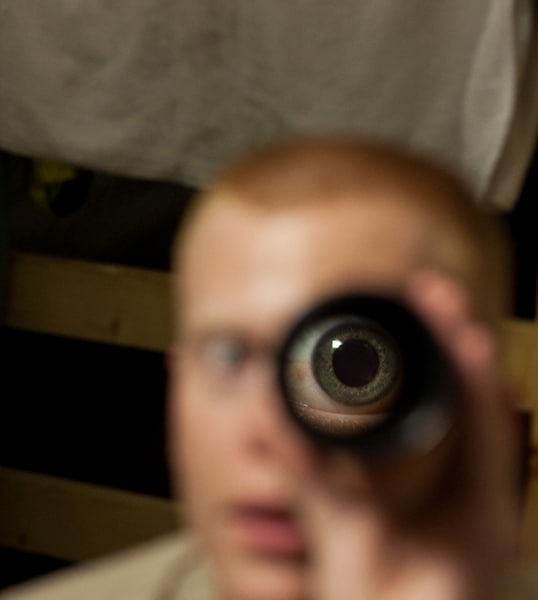 This rather mundane experience is not as harmless as it seems.
This rather mundane experience is not as harmless as it seems.



